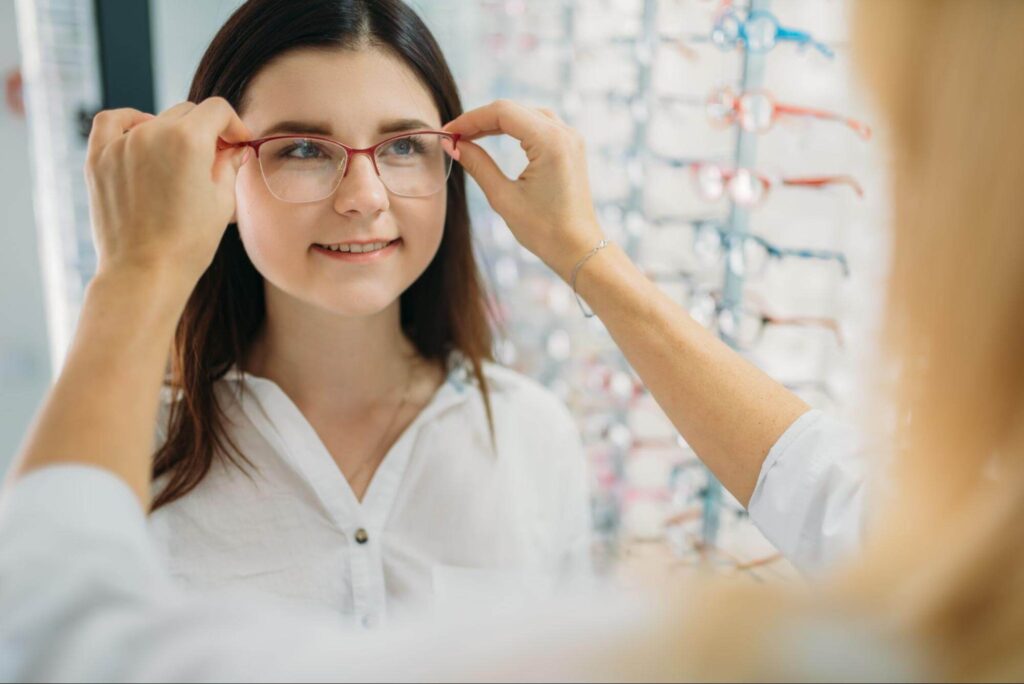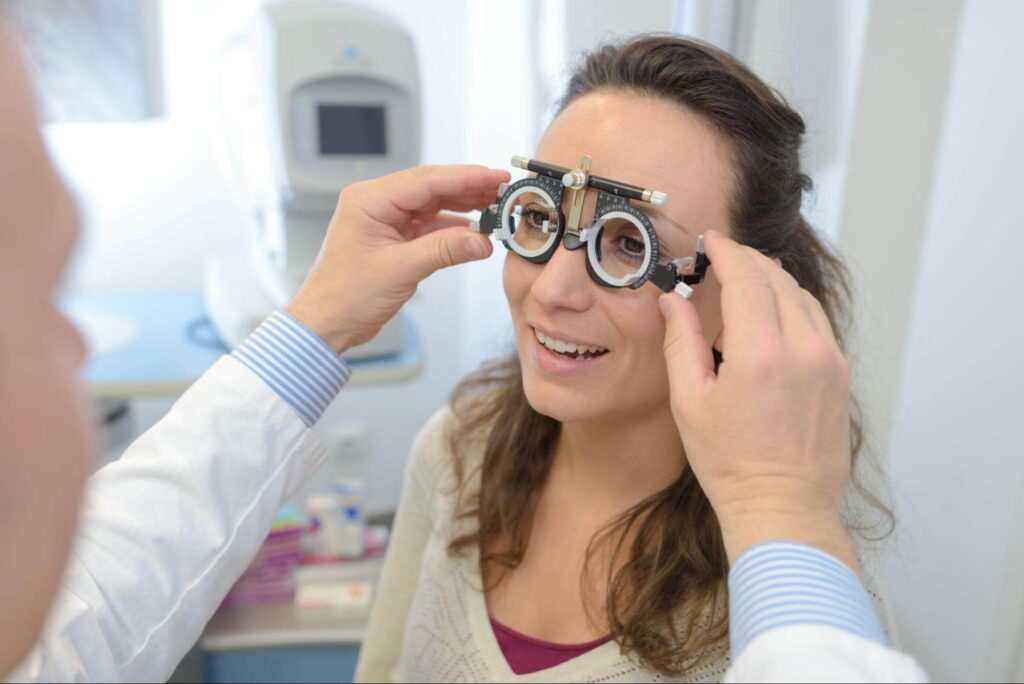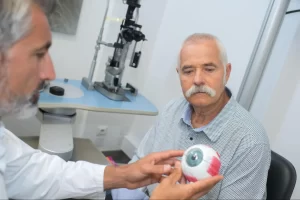Ever feel like your eyes are calling it quits after a day of staring at screens? Between phones, computers, and TVs, it can feel like our eyes don’t get much of a break. You might have heard about the benefits of blue light glasses, but let’s be honest—do they really help, or are they just another trend?
If you’re wondering what the deal is with these glasses, you’re not alone. Lots of people are turning to blue light glasses to ease eye strain, improve sleep, and generally feel better after hours of screen time. So, can a pair of glasses actually make a difference? Let’s discover together!
What Is Blue Light And Why Should We Care?
Blue light is part of the light spectrum and surrounds us in various forms. Natural sources, like the sun, emit it, as do artificial sources like LED lights, computer screens, and smartphones. Blue light stands out because of its short wavelength and high energy, which allow it to penetrate deeper into the eye than other types of light. While some blue light helps regulate our sleep-wake cycle, too much—especially from screens—can cause negative side effects.
This is where blue light glasses come in. What do blue light glasses do exactly? They filter out a portion of this high-energy blue light, aiming to reduce eye strain and protect our vision from long-term effects, making screen time a bit less harmful.
Can Too Much Blue Light Affect Your Eyesight?
When we’re glued to screens, it’s common to experience “digital eye strain”—dry eyes, blurry vision, headaches, and that overall worn-out feeling. If you suffer from chronic symptoms, like those associated with dry eyes, the effects of blue light can be even more pronounced. Plus, blue light exposure, especially in the evening, can mess with our natural sleep schedule. Since blue light tells our brains that it’s still daytime, it can make it harder to wind down and fall asleep at night.
Worried About the Impact of Blue Light on Your Eyes?
Reach Out!
Blue Light Glasses: More Than Just a Trend

Blue light glasses are designed with a special lens coating that blocks some of the high-energy blue light from screens and other sources. These lenses can also be crafted as prescription eyeglasses, so you can address both vision correction and blue light protection in one pair. They don’t block all blue light but can reduce the amount that hits your eyes, which may help reduce digital eye strain.
Key Blue Light Glasses Benefits
- Reduce Digital Eye Strain – If you spend a good chunk of your day on screens, blue light glasses can help with symptoms like dry eyes, blurry vision, and eye fatigue. It’s a bit like putting up an umbrella during a drizzle—not a complete shield, but enough to make a difference.
- Improve Sleep Quality – Using blue light glasses in the evening may help your brain relax into “sleep mode” when it’s time to wind down. They help reduce blue light exposure before bed, which can make it easier to fall asleep without that “wired” feeling that comes after an evening of Netflix.
- Support Overall Eye Comfort – Even if you don’t feel strained all the time, the long-term effects of constant blue light exposure can wear your eyes out. Blue light glasses provide comfort, helping you get through the day without that heavy-eyed feeling.
Exploring The Science Behind Blue Light Glasses

So, what does science say? Some studies suggest that blue light glasses benefits extend beyond eye strain relief; other research hints that they might improve sleep quality, especially for those of us who are sensitive to light at night. It’s not magic, but there’s enough evidence to make them worth considering if your eyes feel the burn after too much screen time.
As pointed by research, blue light, especially in the 415-455 nm range, can potentially cause damage to different parts of the eye, including the cornea, lens, and retina, through mechanisms like oxidative stress and inflammation. However, some blue light exposure, particularly from natural sunlight, may have benefits like regulating circadian rhythms and potentially slowing myopia progression in children.
For most people, normal exposure to blue light from digital screens during the day is likely not harmful. But, protective measures may be beneficial for prolonged exposure or nighttime use.
Blue light filtering glasses or screen covers may help reduce potential eye strain and sleep disruption, particularly when using devices at night.
Practical Tips For Reducing Blue Light Exposure (With or Without Glasses)
Here are the daily habits to protect your eyes from blue light:
- Take Frequent Breaks – Following the 20-20-20 rule can really help: every 20 minutes, take a 20-second break and look at something 20 feet away. Simple but effective.
- Adjust Your Screen Brightness – Lowering your screen brightness, especially in the evening, can make a difference.
- Keep Screens at Arm’s Length – The farther your screen, the less direct blue light reaches your eyes. Aim for about an arm’s length to give your eyes some space.
Using Tech To Minimize Blue Light
- Try Screen Filters and Night Modes – Most devices now offer blue light filters or night modes that give screens a warmer look during evening hours. Not only does it ease the strain, but it also signals your brain that it’s time to relax.
414 Eyes: Your Partner in Screen-Time Comfort
At 414 Eyes, beyond blue light protection glasses, we offer a wide range of eye care services to ensure your visual health and comfort. Our experienced optometrists provide:
- Prescription glasses and contact lenses
- Macular degeneration testing
- Glaucoma management
- Dry eye treatment
- Myopia control
We also offer comprehensive eye exams to diagnose and monitor various eye conditions. Our state-of-the-art equipment allows for early detection of issues like macular degeneration and glaucoma, enabling timely intervention and management.
Looking to Improve Your Eye Comfort?
Start Here!
FAQs
How does blue light impact computer vision syndrome?
Blue light exposure contributes to computer vision syndrome, causing eye strain, dryness, headaches, and fatigue for people who spend long hours on screens. Using blue-blocking glasses, proper lighting, and taking regular breaks reduces screen discomfort and eye strain effectively.
Is blue light harmful to your eyes?
Yes, prolonged exposure to blue light can be harmful, as it may contribute to age-related macular degeneration. High-energy blue light can penetrate deep into the eye and potentially lead to retinal damage. Studies suggest blue light exposure may have lasting effects on eye health, especially for individuals already under glaucoma management.
How does blue light exposure affect our circadian rhythms?
Too much blue light in the evening can disrupt circadian rhythms—the body’s natural sleep-wake cycle—by affecting sleep-regulating hormones. Limiting screen time and wearing blue-blocking glasses before bed can support your internal clock, demonstrating what blue light glasses can do to promote better sleep patterns.
Are there other solutions besides blue-blocking glasses for reducing eye strain?
Yes, artificial tears can relieve dryness, and good posture and screen breaks help reduce strain. Sunglasses outdoors protect against natural blue light and UV rays, which impact eye health.
Do blue light glasses help with light sensitivity in healthy adults?
Yes, blue light glasses can greatly benefit light-sensitive individuals, including healthy adults. Research suggests prolonged blue light exposure contributes to eye strain and discomfort, especially for those with sensitivity. These glasses help manage visual strain by filtering high-energy blue light effectively.



